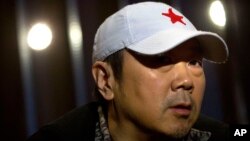China's godfather of rock Cui Jian says his basic message of personal freedom hasn't changed in his new album, even if the world has.
The rocker, who fell out of favor with the government after he sided with demonstrating students during the 1989 Tiananmen protests, said the messages in his songs today may not be different "but the way that you understand could be different" because of the changes China has gone through.
Growing personal wealth among Chinese has created the chance to travel and take control over their private lives, Cui said, a far cry from the tightly controlled society of the 1980s. "They got a chance to make money so this is a big change," he told The Associated Press in an interview Tuesday.
At the same time, other things haven't changed, says Cui, wearing a stylish business suit and his trademark white baseball cap adorned with a red star. There are still limits on how freely you can talk, and "you shouldn't say black and white, you could say something gray and then make it safe," he says.
Cui's first album in 11 years is called "Frozen Light" and he says he hopes his music will inspire Chinese to think about how some things remain static, then "think about whether you take it or you just try to warm it and change it or break it."
The 54-year-old began his musical career with a six-year stint playing trumpet in the Beijing Philharmonic, writing songs and forming a band on the side. He became the symbol of China's embryonic rock scene when he sang his signature tune "Nothing to my Name" at a televised stadium concert in 1986.
That song, in which he sings of desire and dashed hopes, later became the unofficial anthem for student pro-democracy demonstrators. He played on Tiananmen Square just days before the government sent in tanks and troops to crush the protests.
Later, Communist authorities refused permission for his concerts in the capital and censored lyrics. In 2005, he was able to headline at a Beijing stadium. In 2006, he performed with the Rolling Stones in Shanghai, singing "Wild Horses" alongside Mick Jagger.
Today, Cui says people view him more as "an old man" than a rebel, a familiar face on television but no longer influential.
"They don't care about someone who is saying some truth, they just care about your age," he says. "They care about whether you say something they like to hear, because they don't have time to think about serious things."
"I don't even want people to say I'm the godfather of Chinese rock music. I would like to say I'm the grandson of Chinese rock music," he says. "I want to keep doing something, I don't want to sit there and tell people what you should do. I don't like that."
Despite that, Cui says there's greater freedom of expression today and was surprised he'd faced no demands to change the lyrics on "Frozen Light" when he submitted them to authorities, as all artists in China must do. Or perhaps he'd already censored them himself: "The self-censorship is always there."
"Frozen Light" is Cui's first album since 2005, although most of the songs were completed at least five years ago. Cui says he felt the album wasn't ready and, acting as his "own boss," was in no rush.
The record was released on Christmas Day in 119 countries, including the U.S. and Japan, according to Cui's manager Yoyo. He'll follow up the release with performances in Beijing and other Chinese cities in the second half of 2016.
Some Chinese reviewers have been unimpressed, pointing to simple melodies and lyrics employing hard-to-understand classical riddles.
"I would say it's more powerful music, and more original even if there is a lot of melody, even if it is rock 'n' roll," says Cui. "In at least two or three songs, I think I create the groove, which is reggae but it's not like 'on the beach' kind of reggae, not like dance floor music, it's really a heartbeat, with hurt feeling and suffering feeling."
The track "Outside Girl" captures those sentiments, he says, with its lyrics about the humiliations migrants from the countryside to the cities must endure, no matter how hard they strive.
Appraising China's modern rock scene, Cui says that, unlike well-supported but superficial pop acts, China's most talented rockers exist underground without record contracts or management teams.
"That's why people think they're not successful. But in my eyes they're very, very brave. They're saying something ... They talk about the environment, they talk about pollution, they talk about corruption, everything."
Their pop opposites may have music videos, beautiful faces and professional images, but are mere "tools" who don't sing from their souls, says Cui. "They become a soap to wash the people's minds," he says.
"I don't believe in that kind of music. But this doesn't mean they're bad, just I'm tired," he says. "The record industry has a lot of dancers. They have a lot of actors and actresses but not too many musicians."
Next year he wants to see artists — in music, movies and TV programs — speak out about what they feel. "Don't make it just for money, believe it and then you can see the change," Cui says.









